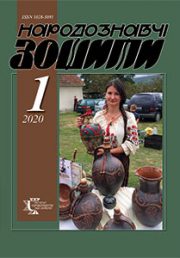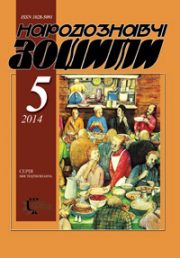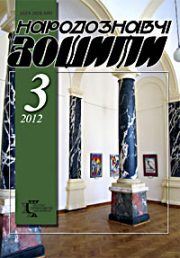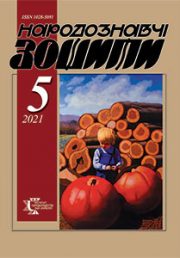The Ethnology Notebooks. 2024. № 3 (177), 670—678
UDK 392.3:398(477):124.5
DOI https://doi.org/10.15407/nz2024.03.670
AXIOLOGICAL ASPECTS OF THE CONCEPT OF CLAN/FAMILY/KIN IN UKRAINIAN FOLKLORE
MUSHKETYK Lesia
- ORCID ID: https://orcid.org/0000-0001-5958-0044
- Maxym Rylsky Institute of Art Studies,
- Folklore and Ethnology of the National Academy
- of Sciences of Ukraine,
- 2-В, Mykilsko-Slobidska Str., 02002, Kyiv, Ukraine,
- Contacts: e-mail: mushketik@ukr.net
Abstract. The purpose of the proposed study is to examine the axiological values of the clan and family in the Ukrainian traditional society of the late nineteenth and early twentieth centuries, based on the material of oral tradition, which is relevant in terms of studying and popularizing the ethical perceptions of Ukrainian society, its best ethnic traditions, and mental qualities of a person.
The values of kin and family were highly valued in the Ukrainian traditional community, they were the basis of people’s material and spiritual life, and the kinship principle, inherited from the ancient tribal system, prevailed as a high moral imperative.
The subject of the study is the peculiarities of the linguistic and folklore reception of value concepts and ideas of the traditional Ukrainian community in various genres of folklore. The analysis of the sources is based on the works of such researchers of the past and present as Mykola Kostomarov, Pavlo Zhytetskyi, Mykola Sumtsov, Ivan Franko, Volodymyr Hnatiuk, Mykhailo Haidai, Oleksiy Dey, O. Razumtseva, Oksana Kis, Hanna Skrypnyk, and others. Kinship centeredness is widely reflected in oral poetry, both prose and song.
The concepts of kin, family, relatives, blood, native land, and homeland are verbalized in folklore as part of the concepts of own/stranger. In ancient times, the greatest punishment was expulsion from the family, abandonment of the family, and deprivation of relatives. Folk songs and other genres of folklore depict the subordinate position of women (young women) in a new family, the marginal status of orphans and widows. A house can be seen as a homeland, a country, a family, and in this sense, it takes on sacred dimensions both externally and internally (archetypes: house-field-temple).
Through the clan, the family, comes the realization that an individual belongs to a larger entity — the state, and feelings of patriotism and love for one’s homeland are formed. The high aspiration for the «proper», its merger with the essential, is found in the carol world of the ideal peasant family, where harmony, peace and love reign, everyone has their own purpose and range of responsibilities, and behaves in accordance with established age and gender norms.
The work methodology has a complex, interdisciplinary nature. Analytical, synthetic, systemic, cultural-historical, comparative, as well as methods of ethnoethics, anthropology, and ethnopsychology are distinguished among the methods used to solve the problem.
Keywords: clan, family, Ukrainian ethos, oral art, values, own/stranger, homeland, ideal of family.
Received 16.05.2024
REFERENCES
- Zhytetskyi, P. (1893). Thoughts about folk dance dumas. Kyiv: Typohr. H.T. Korchak-Novytskaho [in Ukrainian].
- Vanyushyna, O.F. (1997). Specificity of the moral content of mythology: thesis abstract of the candidate of philosophical sciences. Kyiv [in Ukrainian].
- Zhayvoronok, V.V. (2006). Signs of Ukrainian Ethnoculture: Glossary. Kyiv: Dovira [in Ukrainian].
- Hrymych, M.V. (2000). Traditional worldview and ethnopsychological constants of Ukrainians (Cognitive Anthropology). Kyiv: Vipol [in Ukrainian].
- Lysiak-Rudnytskyi, I. (1994). Historical essays: in 2 vol.; trans. from English. Kyiv: Osnovy [in Ukrainian].
- Hayday, M.M. (1972). Folk Ethics in the Folklore of the Eastern and Western Slavs. Kyiv: Naukova dumka [in Ukrainian].
- Hrinchenko, B.D.(1895, 1897). Ethnographic materials collected in Chernigov and neighbouring provinces: stories, tales, legends, proverbs, riddles ets. (Issue I, II). Chernigov [in Ukrainian].
- Shalak, O., Talanchuk, O., & Zavadska, V. (Ed.). (2002). Beyond. Death. 100 most famous images of Ukrainian mythology (Pp. 118—125). Kyiv: Orpheus [in Ukrainian].
- Kylymnyk, S. (1994). Ukrainian year in historical light of folk customs (Vol. 1). Kyiv: Oberehy [in Ukrainian].
- Okhrymovych, V. (1891, 1892). The importance of Little Russian wedding rites and songs in the history of the evolution of the family. Etnohrafycheskoe obozrenye, 4, 44—106; 4, 1—55 [in Ukrainian].
- Makoviy, H.P. (1993). Trampled flower: ethnographic stories. Kyiv: Ukrayinskyi pysmennyk [in Ukrainian].
- Lypa, Y.U. (1953). Appointment of Ukraine. Lviv: Ukr. knyharnya «Hoverlya» [in Ukrainian].
- Hrushevska, K. (1926). Dumas about adventures on the sea of Popovich. Primary citizenship and its survival in Ukraine (Issue 1—2, pp. 1—35). Kyiv: Derzhavne vydavnytstvo Ukrayiny [in Ukrainian].
- Kulish, P. (18560. Foreword. Notes on Southern Rus (Vol. 1, pp. V—IX). S.Pb. [in Rusian].
- Chubynskyi, P.P. (2011). Proceedings of the ethnographic-statistical expedition in the West-Russian region equipped by the Imperial Russian Geographical Society. Southwest depart (Vol. 5). SPb. Kyiv: IMFE im. M.T. Rylskoho [in Ukrainian].
- Metlynskyi, A. (Ed.). (1854). Folk Sought Russian songs. Kyiv: v Unyversytetskoi typ. [in Ukrainian].
- Chebanyuk, O.(1987) Calendar ritual songs. Kyiv [in Ukrainian].
- Kis, O. (2012). Mother: sociocultural aspects of Motherhood. Folk Culture of Ukrainians (Vol. 3, pp. 217—234). Kyiv: Duliby [in Ukrainian].
- Kostomarov, N. (1890). Family life in the works of South Russian folk song creativity. In: Kostomarov N.Y. Literary heritage. Autobiography N.I. Kostomarov: Poetry, scenes, historical excerpts, Little-Russian folk poetry, last work (Pp. 287—477). SPb. [in Rusian].
- Dey, O.I., Marchenko, M.H., & Humenyuk, A.I. (Ed.). (1967). Humorous songs: Family-housegold songs. Kyiv: Naukova dumka [in Ukrainian].
- Ohiyenko, I. (2017). Our literary language. Kyiv: Nasha kultura i nauka [in Ukrainian].
- Hnatyuk, V. (Ed.). (1902). Galician-Rus People’s Legends. Ethnographic collection (Vol. XII—XIII) [in Ukrainian].
- Razumtseva, H.I. (2004). Moral-ethical views of the Ukrainian people according to folklore sources: axiological aspect: thesis abstract of the candidate of philosophical sciences. Kyiv [in Ukrainian].
- Sumtsov, M. (1910). Significance and beauty of Ukrainian folk poetry. In: Sumtsov M. Drawings from the life of the Ukrainian folk word. Kharkiv: b. v. [in Ukrainian].
- Sumtsov, N.F. (1888). Essays on the history of South Russian apocryphal tales and songs. Kiyv [in Ukrainian].
- Kolessa, F. (1938). Ukrainian oral literature. Lviv: Druk. Nauk. T-va im. Shevchenka [in Ukrainian]
- Franko, I. (1902). What is poetry? Foreword to collection «The choice of declamations for Rus peasants and townspeople» (Pp. 10—11). Lviv [in Ukrainian].







